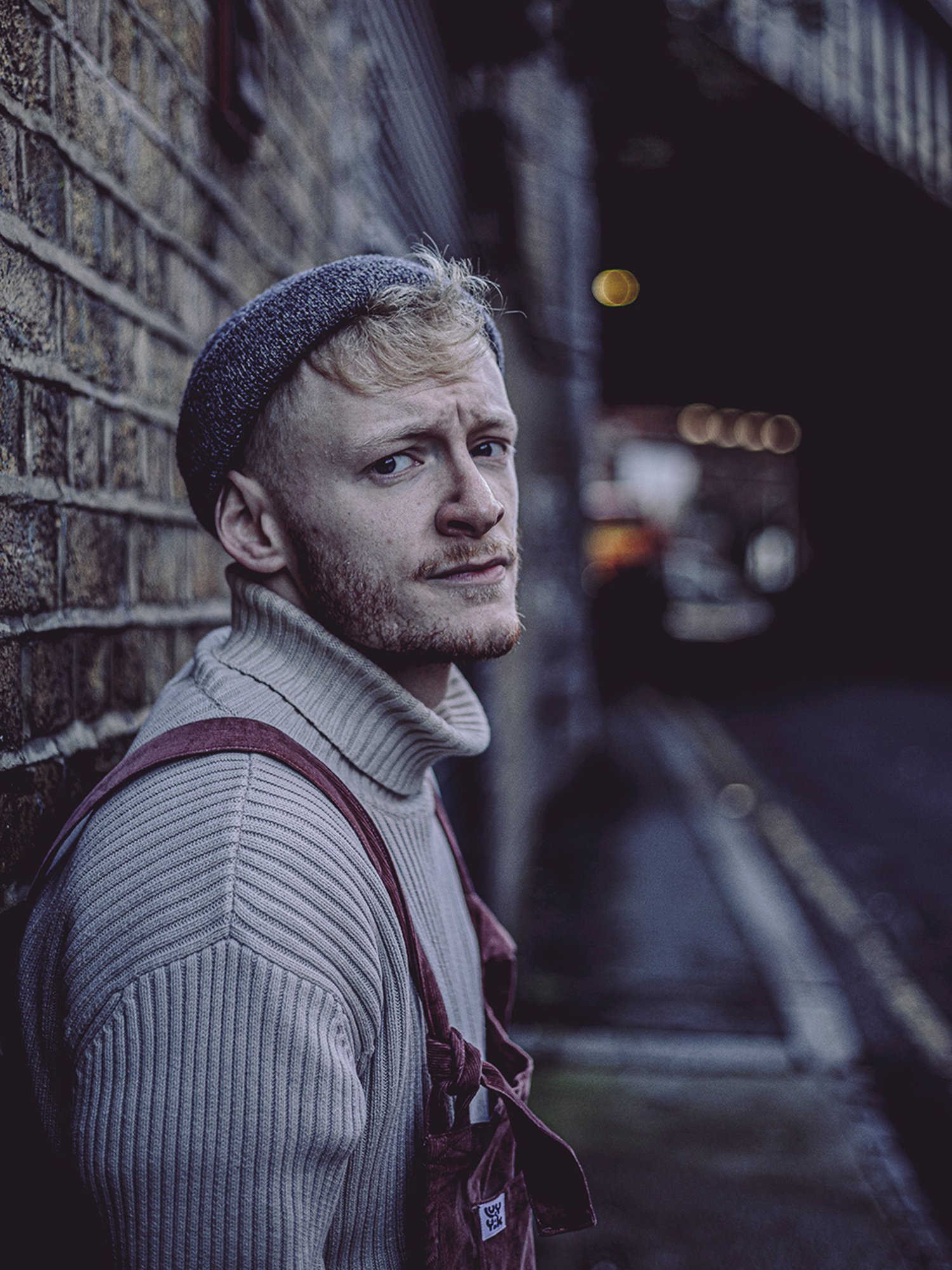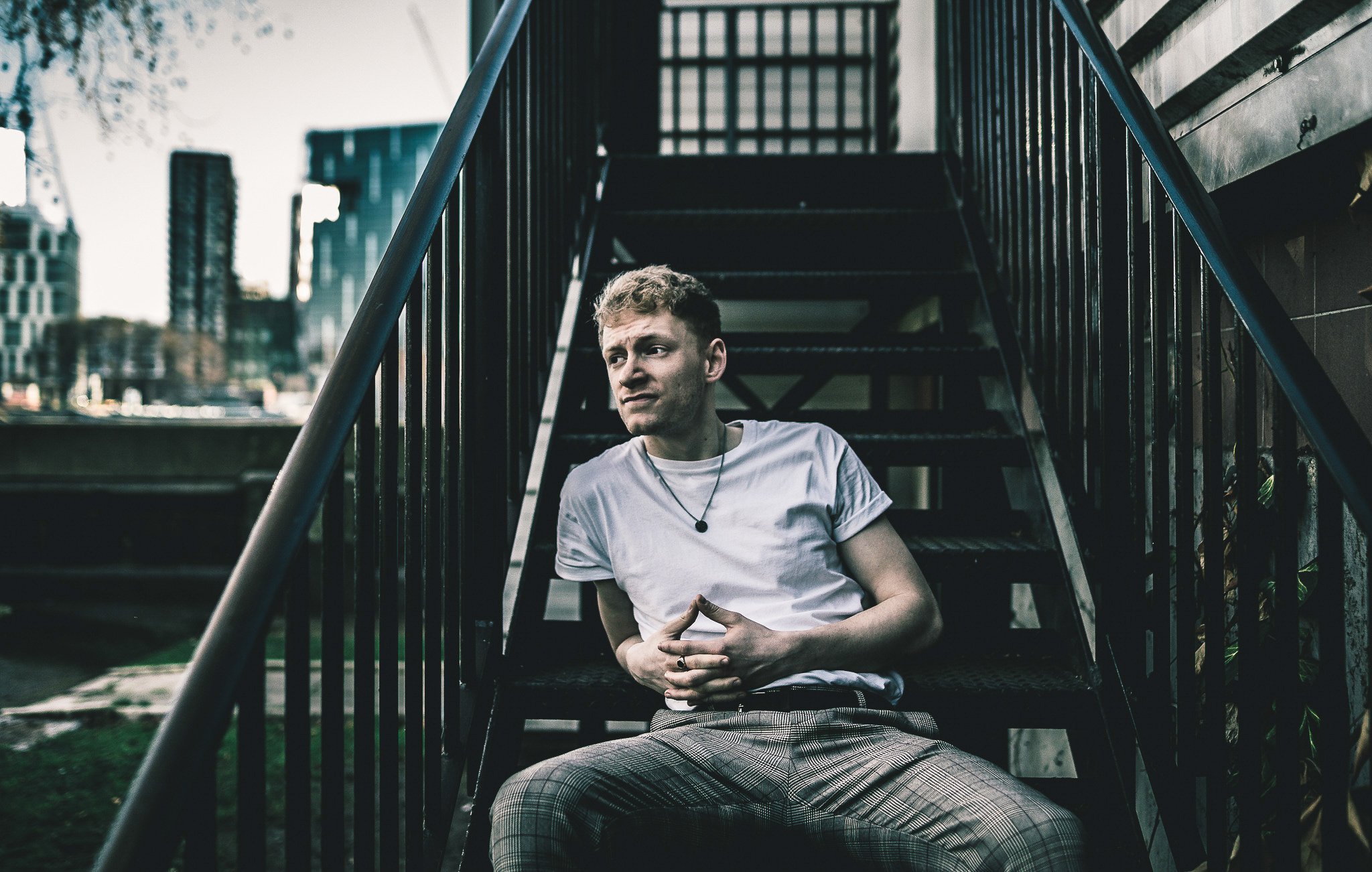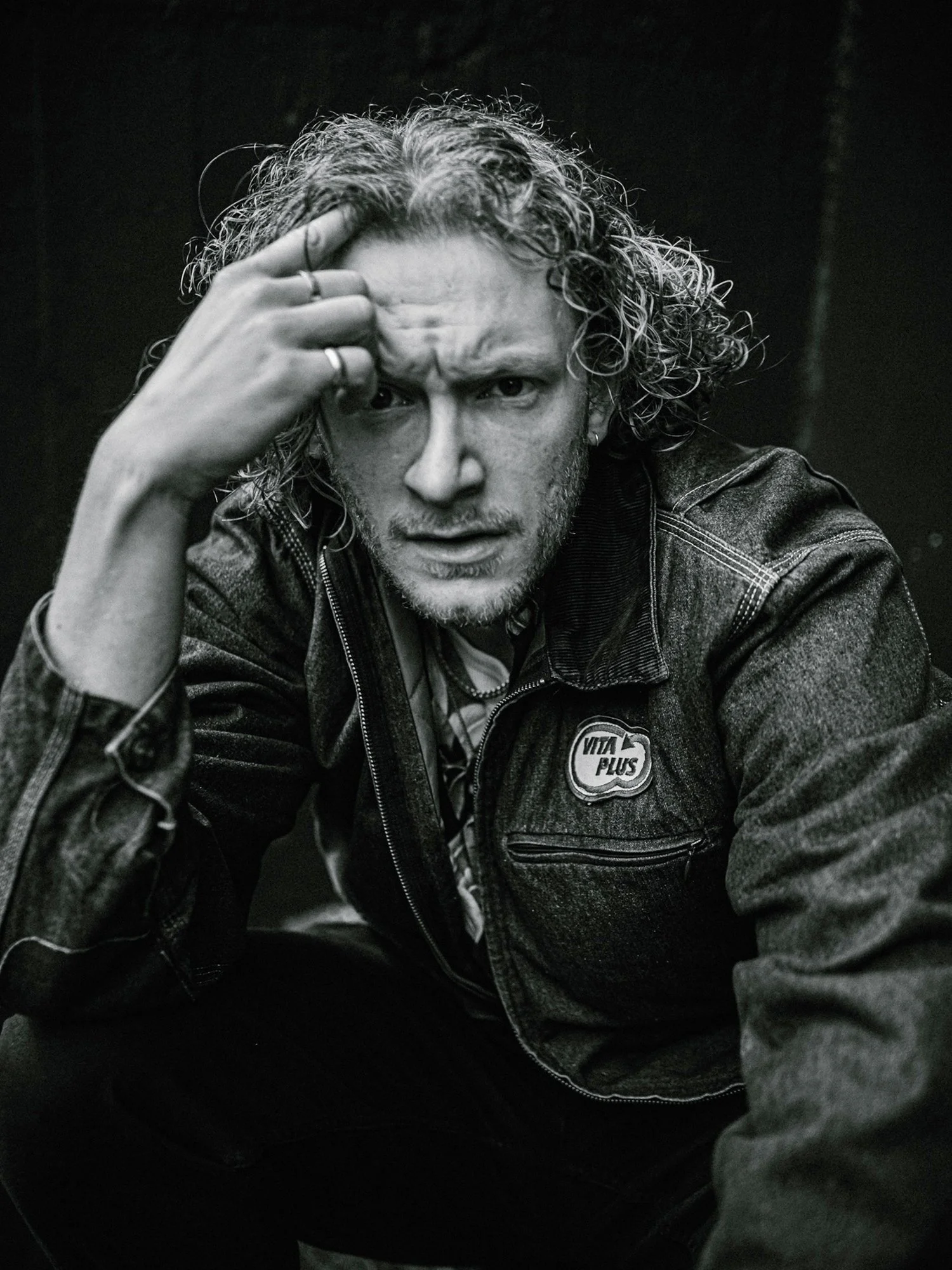
Elliot Cable
Introducing the artist.
Elliot Cable is an actor, writer, and producer based in the UK. He’s a graduate of the acclaimed Mountview Academy of Theatre Arts in London and the creator of one of my favourite short films: Veto. He has appeared in Venom: Let There Be Carnage, plus TV series that include Sweetpea, Grace, and A Thousand Blows. What’s more, his debut feature The Fix is currently (Aug 24) in early pre-production.
Elliot’s also a really lovely guy to hang out with and has some ever so useful reflections to pass on about the creative life and advice for young actors about to enter the profession.
I encourage you to read what he has to say. Over to you, Elliot.
Portrait locations: Shoreditch, Pimlico, London.
Q. Let’s begin with an introduction for people about your creative life. If you were to write a bio about what makes up your creative life, in how it looks today, what would it be?
Weirdly, I think the answer to this question would have been really different a couple of years ago. I would’ve given you the greatest hits of my acting career so far and that would be it. But in the last year or so I’ve started to focus a lot on writing and producing. It feels like when the industry slows down, being a bit of a multi-hyphenate when it comes to creating and filmmaking is really helpful to keep focused and keep your creativity alive. It’s hard to write an introduction succinctly because there’s always so much you want to cram in and shout about. But, to answer your question, I would introduce myself by saying something along the lines of:
Hi, my name is Elliot Cable, I’m an actor, writer and producer. I’ve been fortunate enough to work on some really amazing projects for Marvel, Sky, Disney+, ITV & BBC, including Venom: Let There Be Carnage, Sweetpea, A Thousand Blows, Grace & PRU. I’m currently producing a slate of films with AR Studios including my debut feature film - The Fix - and I am currently in development with my second feature.
Q. You went to Mountview Academy of Theatre Arts. It’s got quite the alumni list. Can you give an insight into how you developed as an actor during your time there.
As cliche as it sounds I think I “became an actor” there. I’d been doing some independent, freelance work before going to drama school - low budget indie films for example. But going to Mountview really gave me the confidence to call myself “an actor”. It taught me so much about how to approach the craft, how to create and refine your process, what tools you need and how to rid yourself of your anxieties and just go for it. I went into the training pretty cynical admittedly, which meant I was sceptical of some of the practices. However, while this doesn’t sound like a good thing, it meant that I was interrogating everything, so when I found something that worked for me it felt transformative.
Q. What are you working on at the moment that is taking up the most of your creative focus? And what is it about it that you are energised by? (completely understand you may not be able to reveal names of projects etc).
I just finished up on a TV show called Sweetpea, starring Ella Purnell, which is releasing on Sky in October. That was a really fun time, and it was my first recurring TV role, so that energised me massively.
Aside from that, I’ve really gotten stuck into my writing recently as I mentioned before. My debut feature - The Fix - is currently in early pre-production with AR Studios. This script has been six years in the making now, so to finally have it finished and in the hands of other people who are trying to get it made is really exciting! But the thing currently taking almost all of my creative focus and energy is my second feature which I’m writing. It’s been a really interesting process for me, as with The Fix I started writing it with the intention of getting it made on an indie budget, which informs the decisions you make and the kind of story you’re telling.
However, this latest one is my first time writing as freely and as recklessly as possible with no other intention other than to serve and best tell the narrative, and that’s been really fun and freeing. It does mean that the film needs a Hollywood budget, but a boy can dream...
Q. Can I move onto Veto, the short film you wrote, produced, and had the lead role in. There’s a line early on. ‘She came… and she brought the dickhead.’ It’s a great line, followed by another, ‘Fuck, he’s handsome.’ When you wrote it, or when you write other lines of such comedic/dramatic quality, what is that like? I think what I’m trying to articulate is, when you nail a line as a writer, does it come naturally, in a flow, or does it require prising out in a staring at a blank piece of paper kind of way?
I think Veto for me is a bit different to other projects. It feels a lot more personal and there’s a lot of “me” in that character. So lines like that sort of just come out and you don’t realise they’re good lines or bad lines until someone else reads or watches it. Weirdly, after having seen Veto a million times, I saw it for the first time on a big cinema screen last year, and that was a totally new experience for me. Suddenly, you’re seeing it and hearing it in a totally different way.
To answer your question more directly, a lot of Veto came naturally and was written quickly, but other parts took a lot of time to refine. But when you get into the flow of a story and you get to know a character, you can figure out what dialogue “works” and what doesn’t. So much of the script that we shot got cut in the edit, so I think there’s a lot to say around the whole filmmaking effort that went into it that made those lines “good”. I just wrote them, said them, and hoped for the best.
Q. There’s a line your character Toby says in the cafe in Veto, ‘Do you remember, I served Bill Nighy at that table’. I’m sure the answer is no, but just checking this was not taken from real life. I.e, did you used to work in a cafe and one day Bill Nighy came in?
It’s not based on me actually serving Bill Nighy, but it is based off of me seeing him in a little cafe one day. So when I was writing that moment I just thought “yeah Bill Nighy is the type of bloke to just sit in a cafe and think nothing of it”.

“Treat every audition like an opportunity to perform, and treat every audition individually - don’t let the fact that you’ve not heard from your last audition affect your performance in the next one.”
- Elliot Cable
Q. Having wrote Veto and also been producer, how difficult was it to preserve the part - from energy to focus, - on the part that people see: that of an actor. How difficult was it/is it to compartmentalise the demands of the three roles, or, do you not need to and all three run concurrently?
I think every actor/writer/producer would give you a different answer, but for me it’s very much about compartmentalising. I can be the writer and the producer and juggle, juggle, juggle all day long, but when it comes to rehearsals and eventually shooting, I have to kind of shake that stuff off and just be an actor. I can’t focus on how the action or dialogue is sounding, or how the production is being organised, at that point it’s then down to the director and the production team.
I have to really focus on the acting, otherwise I fear you’ll see it - you’ll see in the performance that my mind is elsewhere. For me, I think the most important thing when you’re in multiple roles in a production is to have people that you trust. So that when the time comes for me to do a scene, I can say “okay I’m not the producer anymore, any issues you can talk to X” and I know it’ll be sorted.
Q. Final question about Veto, and a short one. Looking back on the short film, what are you most proud of?
I’m really proud that it gets a laugh. But equally, I’m proud that it lands with people emotionally too. I really wanted to strike on this quarter life crisis that I know a lot of young people have - certainly I had it, as did a lot of my friends - and explore that manic, scary time through moments of comedy and I think I did that.
(Note from interviewer, David: Go check out the short film Veto)
Q. Taking on Skin looked, from the outside, like a role you were really into. Is that fair? It got me thinking about when you look at a script and hear about a project, how do you discern whether it is right for you?
Taking on Skin is a funny one. I randomly got a call one day from the writer/director - Gihan Muthu Wagaa - who I didn’t know at the time (I still don’t know how he got my number!). He just told me “look, read it, let me know what you think. If you’re not interested I’ll never contact you again.” It bothered me that he’d managed to get my number, so I really didn’t want to like it. But low and behold he sent this powerhouse of a script, with a character that started to forge so clearly in my mind. We did three months of rehearsal for it, and Gihan let me go wild on the character, Asher - who he was, his backstory, how he dressed, everything. And I can say pretty confidently that it was my favourite character I’ve ever played. It felt really free and easy, but also gritty and intense.
I guess to answer your question properly, when you are offered a job outright without an audition, there are scripts where you go “okay I can do this, I want to work so if it sounds half decent I’ll just do it because I want to perform.” And then there’s scripts that make you go “fucking hell, I have to do this. It can’t be anyone else, it has to be me.” But obviously the flipside to it is that you don’t get gifted projects like that very often, it’s more common that you’re auditioning for them where that choice is taken out of your hands - all you can do is lay down an audition, forget all about it whilst secretly hoping for the best.
Q. You studied History at university prior to Mountview and (and correct me if I’m wrong) did a dissertation on the topic of the standardisation of Time. It sounds like the coolest, most interesting dissertation. Can you take anything from what you learned at university and in your dissertation into your work as an actor?
Yes, that’s right! I absolutely loved it actually, it was a really interesting topic. I think a big part of doing something so academic is that it taught me how to research but it also taught me what good writing is, even though essays and scripts are a world apart there are parallels to be drawn. The research element has come in handy a number of times to help me understand a character or their world and circumstances better. But it’s certainly helped with my writing and the depth of research I’ve done for it - having a genuine curiosity around history and knowing where to look to find your answers is really valuable to the writing process and hopefully makes a story or a character feel more authentic.
Q. Given you’re a writer and an actor, I’m going to predict that you need to do both or either to keep you sane/with the sense of being alive. If that’s true, why is that? What is it about being creative that you makes you tick?
You’re right, I certainly need both. The reason being that writing is within my control, I can do as much or as little as I like, I can do it when the mood takes me. It fills my time creatively and it’s pretty low stakes. Acting, however, is in the hands of other people. You’re constantly trying to prove to people that you’re right for it. Because of that you don’t get to do it as often as you like, and when you do do it, you may only be doing it for a self-tape. So it feels like a bit of a Yin-Yang balancing act. One is mine and only mine, honed and crafted by me in my own time. The other is someone else’s entirely, and I’m trying to show them that I’m the person to bring it to life in a very finite window of time.
Q. I'm thinking you need a good dose of mental fortitude to navigate the ups and downs of auditioning. Is it a horribly brutal process to go through? Or, is that a misconception from an outsider's perspective (i.e people like me who'll never go through it). And if it is brutal, how do you survive it?
It certainly is brutal. A lot of the time it feels contradictory as well. Everything is self-tapes now where you record your audition at home. So you’ll spend an hour doing multiple different takes, testing weird and whacky choices. You’ll send off what you’re sure is the best piece of acting you’ve ever done, and never hear back. But then for some reason, you send off some rubbish you cobbled together in ten minutes between getting home from work and cooking dinner, and somehow you book it. It feels like there’s no consistency, you can’t predict it at all. Any time I’ve thought “I’ve bagged this role for sure”, I definitely haven’t…
I’ve luckily always been thick skinned, so the rejection hasn’t been as brutal for me, and getting to the stage where it’s not the be all and end all is really important for your mental health. When I was younger and first starting out, acting was my life 24/7 and every rejection stung. As I've gotten older, I’ve started to treat it with a degree of separation for what it is - a job (it doesn’t have to be so sacrificial). You still need to live your life outside of it; take holidays, see your family, spend time with your friends. It also helps to get your head around just how specific the casting process is. You may be the best actor in the room, but if you’re blonde, and they envisioned the character as brunette, then you’ll lose out to a person with brown hair. It is what it is.
The process is incredibly brutal because there’s often a lot of money on the line. Gone are the days of being able to use a bit of charm in the audition room, self-tapes have made the process sterile, impersonal but efficient. We’re also seeing more actors than ever before in the industry, so fighting through the volume of auditions needs to be made easy I suppose. Seemingly, from thinking about this question, my answer is mental fortitude. Understanding why decisions are made and how, that’s how I survive it. But also having other creative outlets, living your life, being a human being outside of the industry helps to keep your head above water.
Q. If it is not too early to look to the near-ish future (2025 onwards). What do you want to be doing?
I would certainly like to shoot The Fix in 2025, that is a very clear goal for me. I’d also like to develop my second feature and just generally experience the producer side of filmmaking a bit more. As an actor, it feels like TV is more my direction currently, so I would love to explore that more.
Q. Final question. You’re standing in front of a bunch of actors about to graduate from Mountview. They say, ‘Elliot, tell us something useful about how to survive as an actor.’ What are you going to tell them?
A lot of the above feels like advice for survival, but ultimately I guess have hobbies, do stuff that isn’t related to the industry, so that when you are called up to audition, it comes with a fresh excitement. Treat every audition like an opportunity to perform, and treat every audition individually - don’t let the fact that you’ve not heard from your last audition affect your performance in the next one.
Fundamentally, everyone finds different ways to survive - whatever yours is, just do it. Find a way to feel creative and keep that spark alive. You’ll have a load of shitty survival jobs that feel like a waste of your time, and do their best to extinguish that, but don’t let it!

View more Portraits of Artists.
Let’s work together.
To make an enquiry, simply send me a message via the form below and I’ll get right back to you. I’m based near Tauranga and work across New Zealand.
